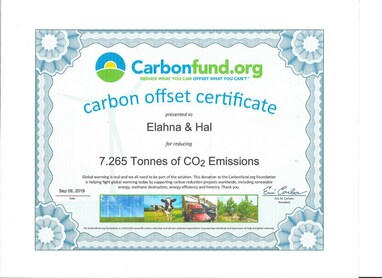
Last week I became a carbon criminal by buying round-trip airline tickets to Europe.
Wait, I got reasons. In October my wife will speak at a medical conference in Venice so I thought it was a good time to tour some World War II sites in Germany -- to research a writing project; hey, Dachau and Nuremberg aren't fun -- and then why not meet Elahna for a romantic vacation in Paris since we're in the neighborhood, right? Like they say, a happy wife is a happy...
I know, I know. Greenhouse gases don't care for excuses and don't come with a provenance. Expelled in a noble cause. Burped up to put to food on your family (in the surreal words of George W. Bush). Emitted with extreme privilege and hedonistic abandon. None of that matters to the gases. Bottom line: if you really want to cut down your carbon footprint, don't go flying to Paris.
Or -- workaround! -- buy carbon offsets. That's what I've done for several years now when I ride in planes and trains. Sure, it's not as good as staying put, but it's not nothing either. This article in The New York Times does a fine job weighing the pros and cons, economically and environmentally, of buying offsets as a way to make up for burning greenhouse gases.
Wait, I got reasons. In October my wife will speak at a medical conference in Venice so I thought it was a good time to tour some World War II sites in Germany -- to research a writing project; hey, Dachau and Nuremberg aren't fun -- and then why not meet Elahna for a romantic vacation in Paris since we're in the neighborhood, right? Like they say, a happy wife is a happy...
I know, I know. Greenhouse gases don't care for excuses and don't come with a provenance. Expelled in a noble cause. Burped up to put to food on your family (in the surreal words of George W. Bush). Emitted with extreme privilege and hedonistic abandon. None of that matters to the gases. Bottom line: if you really want to cut down your carbon footprint, don't go flying to Paris.
Or -- workaround! -- buy carbon offsets. That's what I've done for several years now when I ride in planes and trains. Sure, it's not as good as staying put, but it's not nothing either. This article in The New York Times does a fine job weighing the pros and cons, economically and environmentally, of buying offsets as a way to make up for burning greenhouse gases.

Carbonfund.org makes the process pretty easy. You can choose to spend your money on a variety of reforestation, energy efficiency or renewable energy projects, and they even send you a nifty certificate. The average American has a carbon footprint of about 50,000 pounds of CO2, including, according to the website, emissions from "home, car, air travel and everything you use." Offsetting two round-trip tickets to Europe made me feel better about burning around 16,000 pounds of CO2 and cost $72.65. This total included radiative forcing, which accounts for the warming effects of nitrogen oxides, sulfur oxides, black carbon and water vapor expelled at high altitude.

However, a word of caution. A few years ago, I gave one of my older brothers a carbon offset as a present -- big mistake! Sumner roams the globe in retirement, attending economic conferences and visiting friends, family and exotic places. Therefore, his carbon footprint is huge. Anyway, he did not appreciate, not one whit, my emailing him a certificate absolving him of a round-trip from Honolulu to Boston. "There's more to life than a carbon footprint," he snapped back, which is certainly true as well as an effective dig. But Sumner, what about that letter you signed with a hundred other economists calling for a carbon tax? You boasted about it on Facebook, so shouldn't you at least try in your own life...oh shut up, Hal. People don't like didactic gifts and they don't like being made to feel more guilty about stuff they already feel guilty about -- especially by their little brother.
Besides, there's something spiritually questionable about offsetting carbon. It's a bit like throwing a nickel in a jar every time you yell "Get a job" at a homeless person and then sending the proceeds to the local shelter. Or like rarely voting for women, but tossing a hundred bucks to Emily's List. Or, for a severe example from the Middle Ages, buying indulgences from the Church and then setting off on the Crusades.
Nonetheless, it's better than nothing. Ah, four nights in the City of Lights...
Besides, there's something spiritually questionable about offsetting carbon. It's a bit like throwing a nickel in a jar every time you yell "Get a job" at a homeless person and then sending the proceeds to the local shelter. Or like rarely voting for women, but tossing a hundred bucks to Emily's List. Or, for a severe example from the Middle Ages, buying indulgences from the Church and then setting off on the Crusades.
Nonetheless, it's better than nothing. Ah, four nights in the City of Lights...
 RSS Feed
RSS Feed